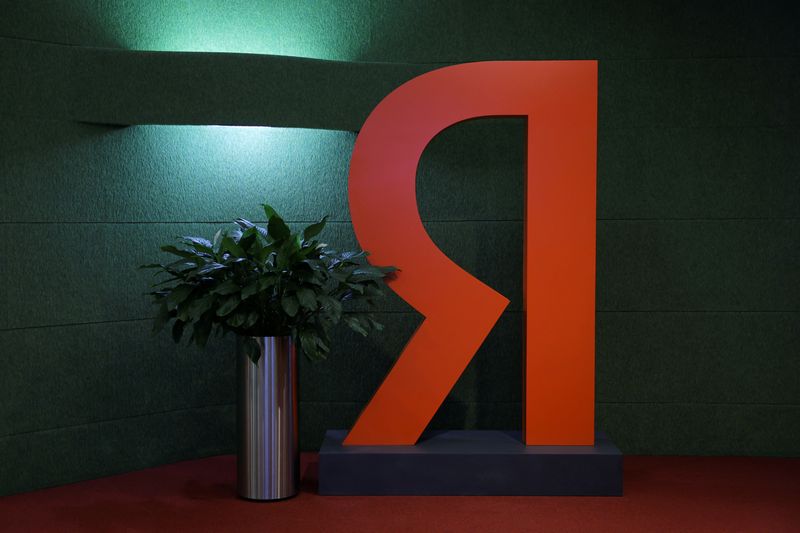
©Reuters. FILE PHOTO: The logo of Russian technology giant Yandex is on display at the company’s headquarters in Moscow, Russia, December 9, 2022. REUTERS/Evgenia Novozhenina/File Photo
By Alexander Marrow, Darya Korsunskaya and Polina Devitt
LONDON (Reuters) -Before Moscow’s invasion of Ukraine two years ago, the Nasdaq-listed Russian search engine giant Yandex (NASDAQ:) was briefly worth $30 billion. This week, a consortium of domestic investors reached a deal to buy it for $5.2 billion.
In normal times, this would spell disaster for Dutch parent company Yandex NV and its Western shareholders.
But in a world where Western companies have left Russia en masse, sometimes for a nominal fee, and Moscow has unilaterally seized foreign-owned assets, there is a sense of relief, if not triumph, after 18 months of tense negotiations.
Reuters spoke to nine people familiar with parts of the negotiation process, including Yandex employees and consultants, investors and negotiators on both sides, to establish how the deal came about and what might happen next.
The sources declined to be named due to sensitivities surrounding the deal before it closed.
“A great job has been done,” said former Russian finance minister turned Yandex adviser Alexei Kudrin on Monday, whose meetings with President Vladimir Putin in 2022 were crucial in securing the green light to proceed with the deal . “The trial is ongoing.”
Six months earlier, the purchase of Yandex’s Russia-based assets, which generate more than 95% of revenues, by Russian investors appeared in jeopardy when company co-founder Arkady Volozh called the invasion “barbaric.” of Ukraine.
Because the Kremlin is highly sensitive to criticism over what it calls a “special military operation,” some on the Russian side of the talks wanted to leave Volozh and Yandex NV with nothing, according to four sources familiar with the matter.
But Moscow’s fear of losing more skilled tech workers to war-induced brain drain has stopped it from forcibly seizing assets and put negotiations back on track, the sources added.
The Kremlin welcomed the deal on Monday and confirmed on Friday that meetings had taken place between Putin and Kudrin. Kudrin and Yandex NV declined to comment further while Volozh did not respond.
BUYER POOL DECREASING
Other times, new Western sanctions on potential buyers, and on Kudrin himself, have caused delays and adjustments. The negotiations, led by Yandex, were very complex and the agreement required the approval of Russia, the United States and the European Union.
Once closed, it will be the most significant corporate acquisition in Russia in two years, leaving one of the few local companies with true global potential before the war under internal control.
The deal will eliminate Western control over Yandex, often nicknamed “Russia’s Google (NASDAQ:),” and strengthen the Kremlin’s control over the Russian internet space.
Negotiators had to find a suitable transaction currency, ultimately decide on , adapt Yandex’s corporate structure and develop a plan to transfer the listing of the Moscow Stock Exchange from one company to another.
Success seemed so distant that one person involved at one point quipped, “It seems like we’re rearranging the deckchairs on the Titanic.”
Potential buyers, including well-known Russian billionaires with ties to the Kremlin, initially bid for half of Yandex for $7 billion, but as the pool of potential investors shrank, Volozh’s anti-war statement in August came close to derailing the process and pushing the price lower, four of the sources said.
Yandex declined to comment on parts of this story, but stressed that compliance with sanctions regulations is crucial for both sides.
Meanwhile, the risk of expropriation has led Yandex NV to consider extracting money, even at a huge discount, as a relief, two of the people said.
The Kremlin’s success in establishing Russian ownership at a bargain price is more evident. Yandex’s online services, from taxi to food delivery to search, are ubiquitous in the country.
A group of Yandex managers will become majority shareholders with a 35% stake and they stressed that Yandex will maintain its independence, which is crucial for a technology company where staff are the main resource.
The remaining 65% will be split between the oil company Lukoil and the facilities owned by entrepreneurs Alexander Chachava, Pavel Prass and Alexander Ryazanov.
A NIGHTMARE
In encouraging shareholders to approve the deal, Yandex NV pointed to Western companies such as Finnish energy group Fortum, French dairy group Danone and Danish brewer Carlsberg (CSE:) whose local assets were seized by Fly.
Its sales pitch states that companies focused on artificial intelligence in cloud, data solutions, autonomous driving technology and educational technology will thrive when based in Amsterdam.
The risk of the Dutch company being immediately stripped of its intellectual property rights did not materialize with licenses granted until the end of 2024.
But Volozh – who holds an 8.5% economic interest through a family trust although he has no voting rights – is still subject to EU sanctions.
A person close to Yandex NV said this could prevent it from playing a role in the future company, although two sources said legal arguments against Volozh were easing given the proposed full divestment.
In any case, Yandex NV expects to quickly develop the four businesses, with global partners ready to collaborate as soon as the deal is closed, four of the people said.
Yandex NV said it plans to return a “substantial portion” of the net cash proceeds to remaining shareholders via a buyback, but it is not yet clear how much they will receive.
One investor with a stake once worth about $200,000 summed up his feelings succinctly:
“This deal is a nightmare.”